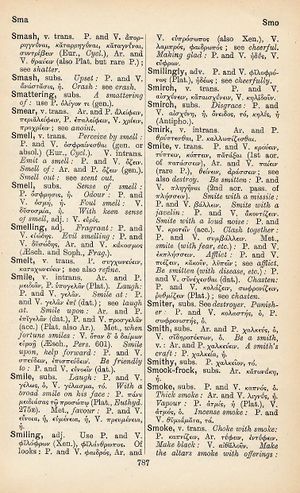smile: Difference between revisions
From LSJ
Ἡ κοιλία καὶ πολλὰ χωρεῖ κὠλίγα → Ut multa venter accipit, sic paucula → Der Bauch fasst wenig, aber ebenso auch viel
mNo edit summary |
m (Woodhouse1 replacement) |
||
| Line 1: | Line 1: | ||
{{Woodhouse1 | {{Woodhouse1 | ||
|Text=[[File:woodhouse_787.jpg|thumb|link={{filepath:woodhouse_787.jpg}}]] | |Text=[[File:woodhouse_787.jpg|thumb|link={{filepath:woodhouse_787.jpg}}]] | ||
===verb intransitive=== | |||
Ar. and P. μειδιᾶν, P. ὑπογελᾶν ( | [[Aristophanes|Ar.]] and [[prose|P.]] [[μειδιᾶν]], [[prose|P.]] [[ὑπογελᾶν]] ([[Plato]]). | ||
[[laugh]]: P. and V. γελᾶν. | [[laugh]]: [[prose|P.]] and [[verse|V.]] [[γελᾶν]]. | ||
[[smile at]]: P. and V. γελᾶν ἐπί (dat.); see [[laugh at]]. | [[smile at]]: [[prose|P.]] and [[verse|V.]] [[γελᾶν ἐπί]] (dat.); see [[laugh at]]. | ||
[[smile upon]]: Ar. and P. ἐπιγελᾶν (dat.), P. and V. προσγελᾶν (acc.) ( | [[smile upon]]: [[Aristophanes|Ar.]] and [[prose|P.]] [[ἐπιγελᾶν]] (dat.), [[prose|P.]] and [[verse|V.]] [[προσγελᾶν]]; (acc.) ([[Plato]] also [[Aristophanes|Ar.]]). | ||
Met., [[when fortune smiles]]: V. [[ὅταν | Met., [[when fortune smiles]]: [[verse|V.]] [[ὅταν δ' ὁ δαίμων εὐροῇ]] ([[Aeschylus|Aesch.]], ''Pers.'' 601). | ||
[[smile upon]], [[help forward]]: P. and V. σπεύδειν, ἐπισπεύδειν. | [[smile upon]], [[help forward]]: [[prose|P.]] and [[verse|V.]] [[σπεύδειν]], [[ἐπισπεύδειν]]. | ||
[[be friendly to]]: P. and V. εὐνοεῖν (dat.). | [[be friendly to]]: [[prose|P.]] and [[verse|V.]] [[εὐνοεῖν]]; (dat.). | ||
===substantive=== | |||
[[laugh]]: P. and V. [[γέλως]], ὁ, V. [[γέλασμα]], τό. | [[laugh]]: [[prose|P.]] and [[verse|V.]] [[γέλως]], ὁ, [[verse|V.]] [[γέλασμα]], τό. | ||
[[with a broad smile on his face]]: P. [[πάνυ | [[with a broad smile on his face]]: [[prose|P.]] [[πάνυ μειδιάσας τῷ προσώπῳ]] ([[Plato]], ''Euthyd.'' 275E). | ||
Met., [[favour]]: P. and V. [[εὔνοια]], ἡ, [[εὐμένεια]], ἡ, V. [[πρευμένεια]], ἡ. | Met., [[favour]]: [[prose|P.]] and [[verse|V.]] [[εὔνοια]], ἡ, [[εὐμένεια]], ἡ, [[verse|V.]] [[πρευμένεια]], ἡ. | ||
}} | }} | ||
{{Gaffiot | {{Gaffiot | ||
|gf=<b>smīlē</b>, f., v. [[smila]]. | |gf=<b>smīlē</b>, f., v. [[smila]]. | ||
}} | }} | ||
Revision as of 09:15, 20 May 2020
English > Greek (Woodhouse)
verb intransitive
Ar. and P. μειδιᾶν, P. ὑπογελᾶν (Plato).
smile at: P. and V. γελᾶν ἐπί (dat.); see laugh at.
smile upon: Ar. and P. ἐπιγελᾶν (dat.), P. and V. προσγελᾶν; (acc.) (Plato also Ar.).
Met., when fortune smiles: V. ὅταν δ' ὁ δαίμων εὐροῇ (Aesch., Pers. 601).
smile upon, help forward: P. and V. σπεύδειν, ἐπισπεύδειν.
be friendly to: P. and V. εὐνοεῖν; (dat.).
substantive
laugh: P. and V. γέλως, ὁ, V. γέλασμα, τό.
with a broad smile on his face: P. πάνυ μειδιάσας τῷ προσώπῳ (Plato, Euthyd. 275E).
Met., favour: P. and V. εὔνοια, ἡ, εὐμένεια, ἡ, V. πρευμένεια, ἡ.
Latin > French (Gaffiot 2016)
smīlē, f., v. smila.

